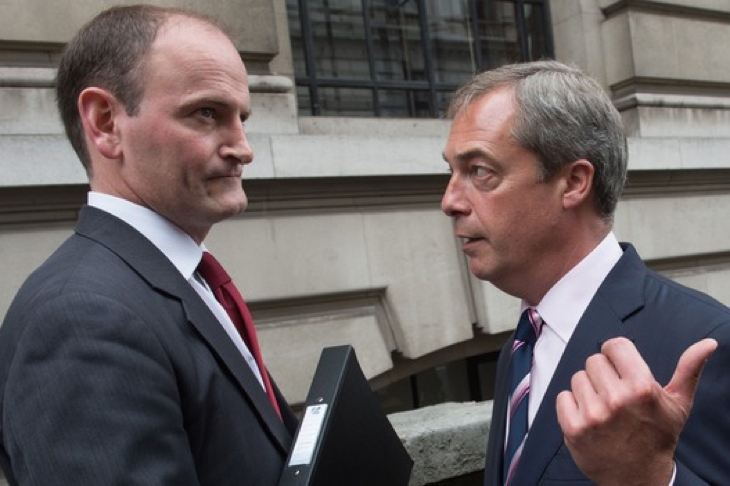Douglas Carswell: Why I won’t call a by-election
On the Sunday Politics, the Clacton MP said: ‘I’m not submitting myself to the authority, to the whip of a new party. If I was doing so then quite rightly, as I did previously, I would feel obliged to trigger a by-election.’ And anyway, he said, he’d consulted 20,000 constituents by email and had ‘a huge number of responses back’ and ‘all but a handful were overwhelmingly supportive’.
Asked if he would run in 2020 as a Tory, he didn’t rule it out, saying he felt ‘pretty comfortable with being independent’ but added: ‘let’s wait and see.’ Carswell couldn’t resist a sly dig at his former leader (whom he trashes in his recent book), noting that there had been several by-elections where Nigel has had the opportunity to contact the electorate and those ‘didn’t always go according to plan’.
Nigel Farage: Carswell should call a by-election
Interviewed on Sophy Ridge on Sunday, Nigel Farage rejoiced at the news that Douglas Carswell had resigned from Ukip and declared that he had ‘wanted to kick him out back in 2015’, claiming that the MP ‘never ever believed in the principles that Ukip stood for’. He also challenged him to call another by-election, saying:
‘This a guy who also sells himself as being very honourable and different from anybody else. One of his big crusades in Parliament has been recall, real recall. The way he himself has said it is that if 20 percent of constituents want a by-election they should have one. So what we are going to do, to show how honourable he is, we are going to write through the Electoral Reform Society to every house in Clacton and ask people whether they want him, as he’s moved, to stand for a by-election.’
Amber Rudd: WhatsApp cannot be allowed to provide a ‘hiding place for terrorists’
Speaking on the Andrew Marr Show, the Home Secretary announced that it is ‘completely unacceptable’ that terrorists should be able to hide behind encrypted channels of communication such as WhatsApp.
‘There should be no place for terrorists to hide. We need to make sure that organisations like WhatsApp, and there are plenty of others like that, don’t provide a secret place for terrorists to communicate with each other. It used to be that people would steam open envelopes, or just listen in on phones, when they wanted to find out what people were doing, legally, through a warrant, but in this situation we need to make sure that our intelligences services have the ability to get into situations like encrypted WhatsApp.’
She added that companies such as Whatsapp and Apple must ‘recognise that they have a responsibility to work with government… when there is a terrorist situation’ and that CEOs such as Tim Cook need to ‘think again’ on this issue.
Jeremy Corbyn: Why does counter-terrorism policy focus so heavily on Muslims?
Interviewed on Peston on Sunday, Jeremy Corbyn called for an overhaul of Prevent, the government’s counterterrorism policy. ‘I think what Prevent has often done is seen to target the Muslim community, not anybody else…. it looks to say there is a kind of suspicion over the whole community and it’s actually often counter-productive…. I’m saying broaden it into an agenda of inclusion. … Focus it on all communities.’
When pushed on whether ‘shoot to kill’ was the right strategy for the police to adopt, Corbyn reluctantly agreed that it was appropriate in a ‘wholly defensive situation’, but that ‘you’ve got to be careful you don’t end up with what we had in Ireland in the 1980s’. But when asked to explain exactly what he thought needed to change, he said he believed that the security services ‘have huge powers of investigation already’ and that the current balance was about right.
Keir Starmer: Six tests for a Labour Brexit
Appearing on the Andrew Marr Show, shadow Brexit secretary Keir Starmer outlined that he was setting six ‘tests’ by which Labour would judge whether to support or reject the government’s final deal for leaving the EU. On the proposed £50 billion settlement, Starmer said that there will be a bill for leaving, but ‘principles must be established’ about what that money is actually for.
Attempting to clear some confusion about his leader’s past comments, Starmer stated that freedom of movement ‘has to go’, but there should be ‘the right rules’ for businesses, hinting that bringing the overall numbers down is not one of Labour’s priorities.






Comments